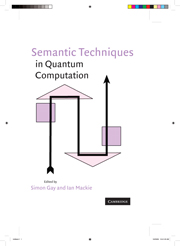Book contents
- Frontmatter
- Contents
- Contributors
- Preface
- 1 No-Cloning in Categorical Quantum Mechanics
- 2 Classical and Quantum Structuralism
- 3 Generalized Proof-Nets for Compact Categories with Biproducts
- 4 Quantum Lambda Calculus
- 5 The Quantum IO Monad
- 6 Abstract Interpretation Techniques for Quantum Computation
- 7 Extended Measurement Calculus
- 8 Predicate Transformer Semantics of Quantum Programs
- 9 The Structure of Partial Isometries
- 10 Temporal Logics for Reasoning about Quantum Systems
- 11 Specification and Verification of Quantum Protocols
- Index
- References
10 - Temporal Logics for Reasoning about Quantum Systems
Published online by Cambridge University Press: 05 July 2014
- Frontmatter
- Contents
- Contributors
- Preface
- 1 No-Cloning in Categorical Quantum Mechanics
- 2 Classical and Quantum Structuralism
- 3 Generalized Proof-Nets for Compact Categories with Biproducts
- 4 Quantum Lambda Calculus
- 5 The Quantum IO Monad
- 6 Abstract Interpretation Techniques for Quantum Computation
- 7 Extended Measurement Calculus
- 8 Predicate Transformer Semantics of Quantum Programs
- 9 The Structure of Partial Isometries
- 10 Temporal Logics for Reasoning about Quantum Systems
- 11 Specification and Verification of Quantum Protocols
- Index
- References
Summary
Abstract
Reasoning about quantum systems has gained prominence due to a big potential in applications such as information processing, security, distributed systems, and randomized algorithms. This fact has attracted research in formal reasoning about quantum states, programs, and processes. On the other hand, temporal logics have proved to be successful in the verification of classical distributed systems and security protocols. In this chapter we extend exogenous quantum propositional logic with temporal modalities, considering both linear and branching time. We provide a weakly complete Hilbert calculi for the proposed quantum temporal logics and study their SAT and model-checking problems.
10.1 Introduction
Reasoning about quantum systems has gained prominence due to their potential applications in information processing, security, distributed systems and randomized algorithms. This has attracted research in formal reasoning about quantum states (see for instance van der Meyden and Patra 2003b, a; Mateus and Sernadas 2006; Chadha et al. 2009; Caleiro et al. 2006) and quantum programs (cf. Knill 1996; Sanders and Zuliani 2000; Abramsky and Coecke 2004; D'Hondt and Panangaden 2004; Altenkirch and Grattage 2005; Selinger and Valiron 2005; Baltag and Smets 2006; Baltazar et al. 2007; Chadha et al. 2006, 2007; Baltazar et al. 2008). On the other hand, formal methods have proved to be successful in design and verification of classical distributed systems and security protocols (e.g., Clarke and Wing 1996; Meadows 2003). Herein, we present branching and linear temporal logics for reasoning about evolution of quantum systems composed of a fixed finite set of qubits.
- Type
- Chapter
- Information
- Semantic Techniques in Quantum Computation , pp. 389 - 413Publisher: Cambridge University PressPrint publication year: 2009
References
- 6
- Cited by

